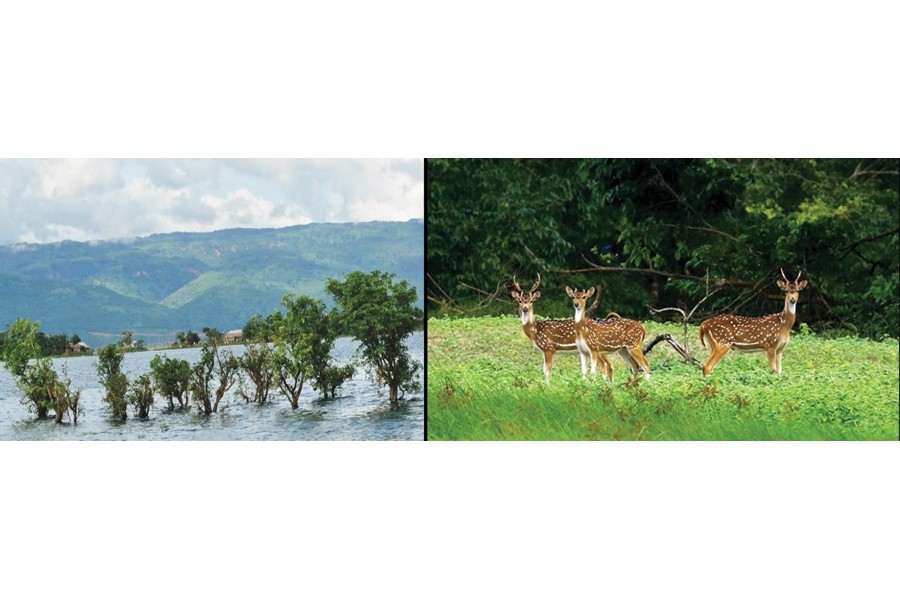
Published :
Updated :

The bond between the greater nature and humans, formed after the complete evolution of Homo Sapiens, seems to be fast becoming fragile. It has lasted for a considerably longer period, despite man's occasional hostility towards nature. In times of need, they would hunt animals and clear forests. But they also planted crops and trees, and domesticated animals. It was only on occasions, the man-nature face-off occurred. The clash was mostly prompted by humans. Wild animals once did swoop on man, a trait sparked by their tendency to protect themselves. Few of the animal species have been known to be attacking human settlements to satiate any brutal extinct. Animals do not encroach on areas inhabited by humans, unless the act is necessitated by urgencies like dearth of food.
All this now sounds like episodes from halcyon days. Beginning from the late-20th century up to the present times, fifty years to be precise, the relationship between man and nature has soured to such an extent that the former has started repenting the savagery it has unleashed on the latter. Great damages have already been done. There seems to be few spaces for a reversal. Meanwhile, the threat of the sixth mass extinction of plants and the whole nature continues to haunt the Earth. The global climate change impacts add enormously to the dread. Being a country with signs of climate change impact, Bangladesh has already begun demonstrating a highly distressing picture: the process of alarmingly fast extinction of its proverbial Royal Bengal Tiger.
Conservationists have lately predicted that these majestic tigers of Bangladesh could disappear from the Sundarbans in the next 50 years, i.e. by 2070. That decades of unbridled poaching and shrinkage of the animal's age-old habitat have led to this plight of tigers needs no elaboration. Due the 70 per cent of the mangrove forest's location at less than one metre above sea level, it's feared to be highly vulnerable to rising water surface. A new study by researchers from Bangladesh and Australia published in the journal Science of the Total Environment draws an alarming picture of the forests' tigers. As they have observed, climate change effects like changing weather patterns, heat waves and extreme weather events are likely to have an even greater impact. Over the decades, the drastic fall in the number of Royal Bengal Tigers used invariably to be blamed on syndicates of illegal hunters. Moreover, the fast encroachment by the nearby human settlements, thus cornering the animals or compelling them to migrate to the Indian part of the forest, would also be singled out as a reason for the tigers' decline in number. But there are some other major reasons, most of which are related to climate change impact.
The researchers at Intergovernmental Panel on Climate Change have minutely assessed the future suitability of the Sundarbans region for tigers. That these tigers will eventually vanish despite different measures taken by the successive governments became a foregone conclusion. The researchers have expressed alarm at the fast decimation of the tiger habitats. As they have observed, three of the 8 (eight) sub-species of tiger worldwide have already become extinct. Against this picture, the tigers of Bangladesh remain a strong representative of the big cat species which could be viewed as hardy and vibrant. But thanks to the hostilities facing them, they, too, are headed for eventual extinction. The most troubling impact of the sea-level rise on the Sundarbans tigers comprises a least-focused reality: the starving tigers. The scientists have quite rationally observed that the sea-level rise and the broadening of the salinated sea water-filled areas can make it harder for plants to grow. It will lead to unavailability of certain food types for the spotted deer of the forest. The dearth of food, tree leaves in the main, is set to have an adverse effect on the deer populations. With deer not around, the tigers are feared to starve to death or go elsewhere, especially the nearby villages, in search of food.
The animal extinction scenario in Bangladesh is not much different from the other countries. In the last 50-60 years, hundreds of species and sub-species of land-based animals, fishes, reptiles and amphibians have completely disappeared from the country. They include rhinos, jackals, rabbit, sub-species of ape, bison, bear and alligators in the main. Many large fishes and aquatic animals like the Gangetic dolphin (Shushuk) are on the verge of total extinction. That the country's forests were once safe home to peacocks, vultures and buzzards might appear a virtual fantasy to the younger people. Pythons and many types of snakes often stray into human settlements. But they are fast becoming a rare sight. Elephants are rarely seen in the Chittagong Hill Tracts.
In many African countries that offer safari trips, there are sanctuaries for endangered species. Though devoid of the amazing varieties of wild animals like in Sub-Saharan Africa, Bangladesh can still boast of whatever primitive animals and birds it still has in its forests and bushy hills. The most pragmatic way to conserve these animals and bird species is by establishing sanctuaries in all parts of the country's forest-dominated areas --- besides the fast-growing Bangabandhu Safari Park in Gazipur. Lots of educated people often question the rationale for setting up exclusive safari parks and sanctuaries in the country. They view untimely cyclones, monsoon, winter and the dreaded sea-level rise as the only climate change impacts. Few of them are least concerned about the continued biodiversity losses caused by the extinctions of the country's flora and fauna. The otherwise conscious people more often than not remain oblivious to the imperative of maintaining ecological balance. The existential equilibrium eventually emerges as sine qua non for a country willing to have a prestigious place in various global indices on living standards.


 For all latest news, follow The Financial Express Google News channel.
For all latest news, follow The Financial Express Google News channel.